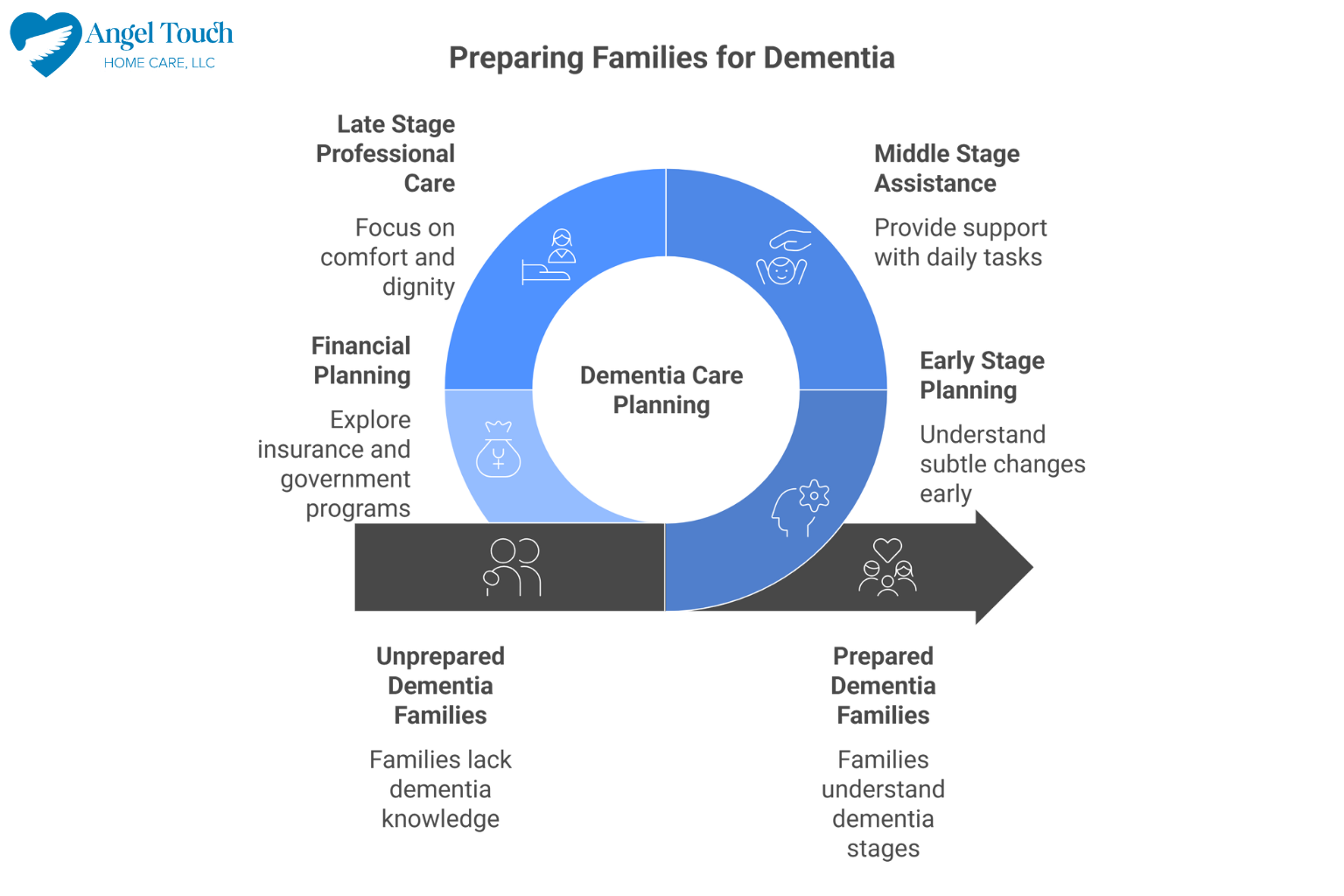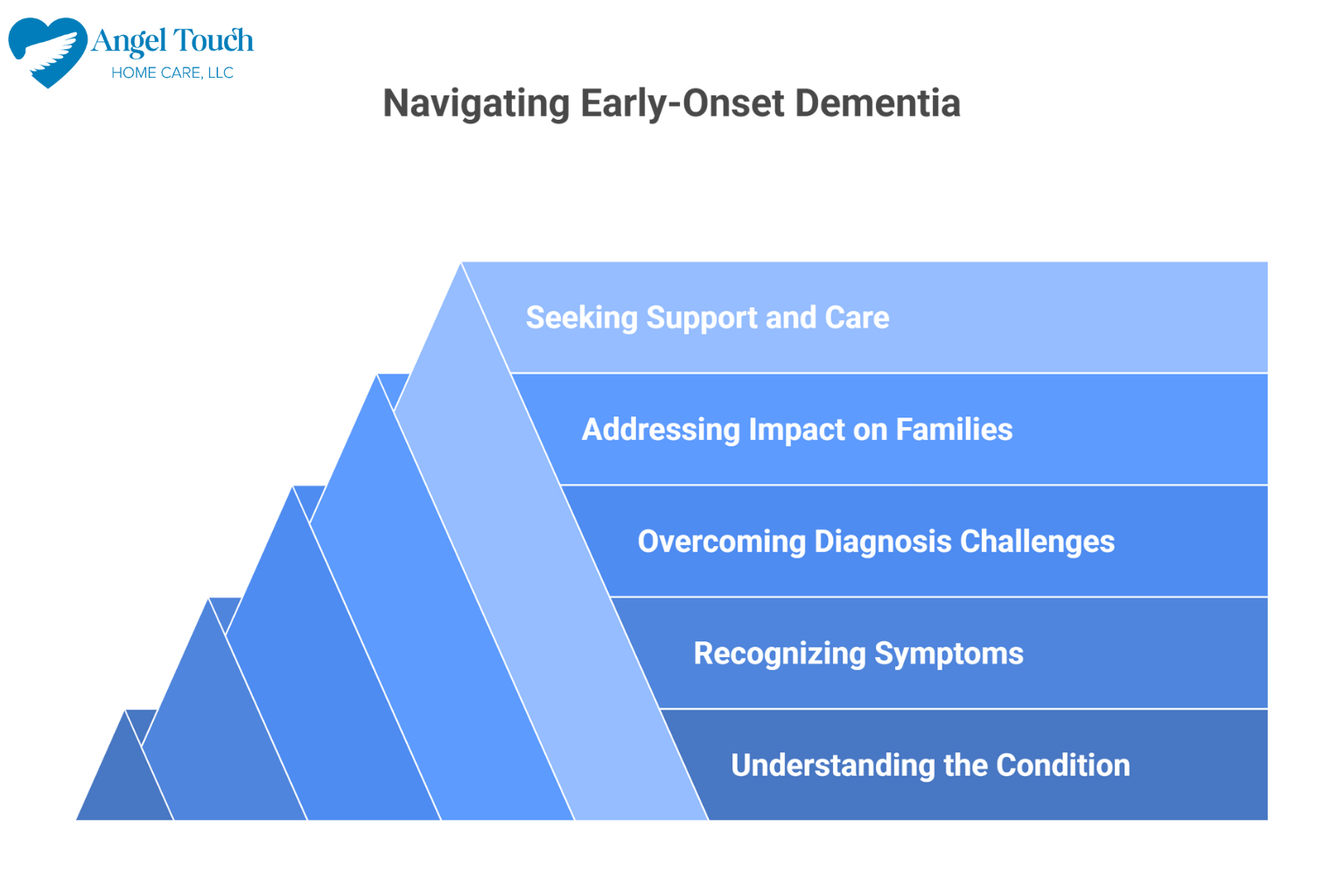Dementia affects millions of families worldwide, progressing through distinct stages that bring unique challenges and care needs. Recognizing these stages helps families prepare for the journey ahead and make informed decisions about care options.
Early-Stage Dementia: Subtle Changes Begin
The early stage of dementia often goes unnoticed because symptoms develop gradually and may seem like normal aging. During this phase, individuals can still function independently but may experience:
- Mild forgetfulness, such as misplacing items or forgetting recent conversations
- Difficulty finding the right words during conversations
- Challenges with complex tasks like managing finances or following recipes
- Slight changes in judgment or decision-making abilities
- Increased difficulty learning new information or adapting to changes
Many people in early-stage dementia continue working, driving, and maintaining social relationships. However, they may begin avoiding challenging situations or rely more heavily on familiar routines. Family members might notice these subtle shifts before their loved one does.

Middle-Stage Dementia: Moderate Symptoms Emerge
The middle stage typically lasts the longest and brings more noticeable cognitive decline. Seniors may need assistance with daily activities and experience:
- Confusion about time, place, or personal history
- Difficulty recognizing familiar faces or remembering names
- Challenges with basic tasks like dressing, bathing, or preparing meals
- Changes in sleep patterns or increased restlessness
- Mood swings, anxiety, or behavioral changes
- Getting lost in familiar places
- Difficulty managing money or making appropriate judgments
During this stage, supervision becomes necessary for safety, and families often begin exploring care options. The senior may still recognize close family members but have difficulty with more complex social interactions.
There are a variety of age-related health conditions that can make it more challenging for seniors to live independently. However, many of the challenges they face can be easier to address if their families opt for professional in-home care. You can rely on expertly trained caregivers to keep your loved one safe and comfortable while aging in place.
Late-Stage Dementia: Extensive Care Is Often Required
Late-stage dementia brings severe cognitive impairment and significant physical decline. Individuals typically require around-the-clock care and may experience:
- Inability to communicate coherently or recognize family members
- Loss of basic motor skills and mobility
- Difficulty swallowing, leading to eating challenges
- Incontinence and loss of bladder or bowel control
- Increased vulnerability to infections, particularly pneumonia
- Significant weight loss and physical frailty
Professional care often becomes necessary during this stage, whether at home with skilled caregivers or in specialized memory care facilities. Families focus on comfort, dignity, and quality of life rather than trying to maintain previous functioning levels.
Many seniors prefer aging in place over moving to assisted living facilities. If your senior loved one needs assistance to remain safe and comfortable while living at home, reach out to Angel Touch Home Care, a leading Boca Raton home care service agency. Our dedicated in-home caregivers can assist with meal prep, bathing and grooming, exercise, medication reminders, and many other important tasks.
Preparing for Each Stage of Care
Understanding dementia progression helps families plan appropriate care strategies and manage associated costs. Early planning becomes crucial as care needs intensify through each stage.
Long-term care insurance can cover some expenses that increase significantly as dementia progresses. Traditional policies often provide the most comprehensive coverage for memory care facilities and specialized services. Hybrid life insurance policies offer flexibility, while annuities with care riders provide income alongside enhanced benefits for long-term care needs.
Government programs also play important roles throughout different stages. Medicaid covers extensive long-term care costs for those meeting eligibility requirements, while Medicare provides limited skilled nursing coverage. Veterans may qualify for Aid and Attendance benefits that cover some care expenses across all stages.
Family involvement remains vital throughout the dementia journey, though roles shift as needs change. Early stages might require gentle assistance with complex tasks, while later stages demand comprehensive physical care. Developing a family care strategy helps you manage both emotional and financial aspects of long-term care planning.
Aging in place can present a few unique challenges for older adults. Some only require part-time assistance with exercise or meal preparation, while others are living with serious illnesses and benefit more significantly from receiving live-in care. Boca Raton, FL, Angel Touch Home Care are leaders in the elderly in-home care industry for good reason. We tailor our care plans based on each senior’s individual needs, our caregivers continue to receive updated training in senior care as new developments arise. Call us today to learn about our high-quality in-home care services.












